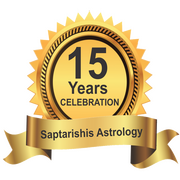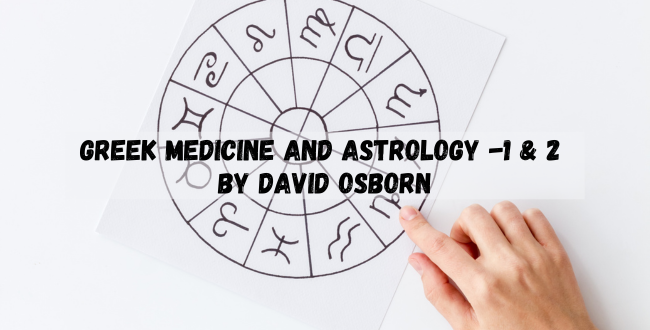Article by David Osborn
Hippocrates, the Father of Greek Medicine, once said that the physician who was ignorant of astrology could not rightly call himself a physician.
Galen, however, was a hard-headed empiricist who tended to be more skeptical regarding Medical Astrology. Nevertheless, the use of astrology in medicine and holistic healing has been a persistent, widespread and time-honored practice in other traditional medical systems like Ayurveda as well.
In Greek Medicine, Medical Astrology is called Iatromathematica, or “doctorly calculations”. After calculating and considering the planetary influences operating in the patient’s natal astrology chart, the medical astrologer would formulate a judgment of the patient’s innate constitutional nature and temperament vis-a-vis his/her acquired condition or health challenges and give his advice and recommendations to the patient.
Medical Astrology, in East or West, is based on the notion of Cosmic Sympathy – that the planetary and celestial influences depicted in the natal astrology chart symbolize or resonate with Universal Life Forces of Nature and the cosmos. Healing is simply a matter of integrating and harmonizing the forces of life and health within the individual with these Universal Life Forces.
All Medical Astrology in Greek Medicine is based on the principles of Hermetic philosophy, which states: “As above, so below; as within, so without.” In
other words, everything that happens within the human body, or the individual
microcosm, has its parallel in the outer macrocosm of Nature and the cosmos.
Qualities and Element
Also important in Greek Medicine is the concept of temperament: that everything in the universe, from the individual human being, to the substances we consume as foods and medicines, and even to the far-flung stars and planets, has its own distinct inherent makeup of qualities and attributes. In Greek Medicine, the primary parameters for measuring temperament are the Four Basic Qualities: Hot, Cold, Wet and Dry.
In Greek Medicine, everything in the universe, including the human body and its various constituent parts, is made up of Four Elements: Fire, Air, Earth and Water – in varying proportions. The Four Elements, and their basic qualities, are:
FIRE: Hot and Dry
AIR: Hot and Wet
EARTH: Cold and Dry
WATER: Cold and Wet
The polarity of Hot versus Cold is called the primary or active polarity because it controls or initiates changes in the other two qualities, Dry and Wet, which form the secondary or passive polarity. Heat evaporates moisture, producing dryness, whereas cold condenses moisture, producing wetness.
The Four Elements I listed above are the same ones used in astrology. I have listed them in order, from the most Yang to the most Yin.
Fire is the most active, dynamic, Yang element because it is the greatest emitter of light, heat and energy. Its basic qualities are Hot and Dry, which are both Yang in nature.
| Of all the traditional medical systems I had studied, Greek Medicine proved to be the closest fit with Medical Astrology. |
Water is the most passive, Yin element because it is the most cooling, and the greatest receiver of energy. It basic qualities are Cold and Wet, which are both Yin in nature.
These two extreme elements, Fire and Water, are inherently Cardinal in modality because, as the polarities of Yang and Yin in Nature, they initiate or drive all manifestation and change. This is abundantly evident in the physiology and metabolism of the human body: Fire assimilates, circulates and metabolizes Water, whereas Water contains and cools down Fire, keeping it in check.
As proof of the inherently Cardinal modality of the Fire and Water elements, we only need to look at the first Fire sign of the zodiac, Aries, and the first Water sign, Cancer; both signs have a Cardinal modality.
The other two elements, Air and Earth, are moderate and mixed in their basic qualities. Since Hot is the primary quality of Air, it is a Yang element – active, subtle, light, dynamic and energetic, although less so than Fire. Since Cold is the primary quality of Earth, it is a Yin element – heavy, dense, passive, substantial – but not as much so as Water.
Being moderate elements caught in the middle, Air and Earth are primarily acted upon by the Cardinal forces of change. Air’s inherent modality is Mutable, since it readily responds to and welcomes change. Earth’s inherent modality is Fixed, since it tends to resist change as the most solid, stable, persistent and enduring element.
Accordingly, the first Air sign of the zodiac, Gemini, has a Mutable modality. The first Earth sign of the zodiac, Taurus, has a Fixed modality.
The Four Temperaments
Actually, I was introduced to the study of Greek Medicine through Medical Astrology. I had tried reading several books on Medical Astrology, but none of them really made any sense to me until I read a book on the subject in French that related the Four Elements of astrology to the Four Temperaments of Greek Medicine. This proved to be the golden key that unlocked the doors of understanding, and after that I was able to bring together everything I had previously learned in the field of traditional medicine and holistic healing under the all-inclusive umbrella of Medical Astrology. Of all the traditional medical systems I had studied, Greek Medicine proved to be the closest fit with Medical Astrology.
There was a simple, neat correspondence between the Four Elements and the Four Temperaments:
FIRE: Choleric Temperament
AIR: Sanguine Temperament
EARTH: Melancholic Temperament
WATER: Phlegmatic Temperament
The Four Temperaments are the basic constitutional body mind types of Greek Medicine. They are analogous to the doshas of Ayurvedic medicine, but instead of three doshas, Greek Medicine has Four Temperaments.
Choleric Temperament
The Choleric temperament is characterized by an abundance of the Fire element and the Yellow Bile humor; it roughly corresponds to the Pitta Dosha of Ayurveda. The Hot and Dry qualities predominate.
Body Type
The Choleric body type is of short to medium build and frame, and has a reddish complexion if heat predominates or a sallow complexion if bile predominates. The physique tends to be lean, compact and muscular, with warm, rough, dry skin and veins and tendons clearly defined. The digestion and metabolism are strong and quick, the urine scanty, thin and dark, and the stools tending to be soft and smelly.
Mind & Personality
In mind and personality, Cholerics are bold, passionate, creative, imaginative, flamboyant and independent. They can also be prone to anger, irritability, impatience, stress, burnout and a short temper. Physically, Cholerics tend to suffer from febrile and inflammatory diseases, infections, bilious disorders, hyperacidity, acid reflux and stress burnout.
Astrology
In astrology, the Fire signs – Aries, Leo and Sagittarius – are basically Choleric in temperament.
Sanguine Temperament
| In astrology, the Air signs – Gemini, Libra and Aquarius – are basically Sanguine in temperament. |
The Sanguine Temperament is characterized by an abundance of the Air element and blood, or the Sanguine humor. It has no real equivalent in Ayurveda, but could be considered a blend of the wetness of Kapha with a little of the heat of Pitta, since the Sanguine temperament is warm and moist.
Galen considered blood to be the very essence of life and health, and the most desirable of all the humors, being perfect nourishment perfectly digested. In Greek Medicine, the Sanguine temperament is generally considered to be the most healthy and balanced.
In Ayurveda, blood is not considered to be a dosha, since the word “dosha” means, “defect”, or an inherent predisposition towards pathology and imbalance. In Ayurveda, blood is Rakta Dhatu, one of the seven tissue types.
Body Type
The Sanguine body type is of medium to tall build and frame, and has a pinkish, rosy, blushing complexion. The physique is elegant, graceful, statuesque and shapely, and the skin smooth, rich and creamy. The digestion and metabolism are generally moderate and balanced, but the appetite, especially for sweet or rich foods, can exceed the digestive capacity. The urine is thick and bright yellow, showing balanced, moderate heat and moisture, and the stools are well-formed.
Mind & Personality
In mind and personality, Sanguines are sociable, outgoing, curious, sensuous, playful, indulgent and optimistic. The very word Sanguine means positive, optimistic and hopeful. Sanguines have a synthetic intellect that likes to see the big picture, and a good sense of social appropriateness, discretion, judgment and communication skills. Physically, Sanguines are prone to excesses and congestions of the blood, metabolic excesses of the blood like diabetes, high cholesterol, uremia and gout, and digestive stagnation and putrefaction from overeating. The respiratory and genitourinary tracts can also be sensitive problem areas.
Astrology
In astrology, the Air signs – Gemini, Libra and Aquarius – are basically Sanguine in temperament.
Melancholic temperament
The Melancholic temperament corresponds with the Earth element, and has a predominance of its humor – black bile, or the Melancholic humor. Its basic qualities are Cold and Dry, giving it a close correspondence with the Vata dosha in Ayurveda.
Body Type
The Melancholic body type tends to be tall, thin and lean, with prominent bones, joints, tendons and veins. The skin is cool, dry and leathery, and the complexion is an olive color or a dull yellow. The appetite and digestion tend to be poor or irregular, the urine pale and thin, and the stools constipated, hard and dry, flatulent or irregularly shaped.
Mind & Personality
In mind and personality, Melancholics tend to be realistic, pragmatic, prudent, cautious, introspective, austere, frugal and withdrawn. Melancholics are also famous for their blue moods. The Melancholic temperament is also called the Nervous temperament, because they are also prone to nervous agitation, stress and exhaustion. Physically, Melancholics also suffer from a colicky, delicate, poor or irregular digestion, constipation, irritable bowel, poor immunity, arthritic, rheumatic or neuromuscular disorders and insomnia.
Of all the Four Temperaments, the Melancholic temperament is the most prone to illness and poor health. That’s because the Melancholic temperament is contrary to the Sanguine in all its basic qualities and characteristics.
Astrology
In astrology, the Earth signs – Taurus, Virgo and Capricorn – are primarily Melancholic in temperament.
Phlegmatic Temperament
The Phlegmatic temperament is characterized by an abundance of the Water element and its Phlegmatic humor, which includes not just phlegm, but also all the clear fluids of the body, like plasma, lymph, synovial and serous fluids.
Being Cold and Wet in its basic qualities, the Phlegmatic temperament corresponds to the Kapha dosha in Ayurveda.
Body Type
The Phlegmatic body type is heavy set, with a heavy frame and bone structure and rounded, pudgy features, with tendons, bones and joints not prominent. The digestion and metabolism are slow but steady in a healthy state, energy conserving and anabolic dominant; with aggravation. However, the digestion and metabolism can become torpid and sluggish. The urine tends to be clear, thick and scanty, and the stools abundant, tending towards softness.
Mind & Personality
In mind and personality, Phlegmatics tend to be sentimental, subjective, sensitive, faithful and good natured. The mind tends to be slow but steady, but with Phlegmatic aggravation, it can become slow, passive and sluggish.
Physically, Phlegmatics are prone to coughs, colds and lung congestion, lymphatic congestion and obstruction, edema and water retention, a slow digestion and metabolism, and a hypoactive thyroid and adrenals.
Astrology
In astrology, the Water signs – Cancer, Scorpio and Pisces – are primarily Phlegmatic in temperament.
These are the basic Four Temperaments, or pure types. However, most of us are of mixed temperament. One of the great strengths of Medical Astrology is its ability to delineate the constitutional nature and temperament, the inherent strengths and weaknesses of the individual, with unparalleled sophistication and intimate detail.
Planets: Nature and Temperament
In Medical Astrology, each planet represents a certain set of physiological or metabolic functions tied together by a common theme, which concerns the planet’s inherent nature and temperament. And, like everything else in Greek Medicine, even the far-flung planets have their own inherent nature and temperament.
The main parameters for measuring a planet’s nature and temperament are the Four Basic Qualities. Each of the Four Temperaments has planets that resonate with its influence.
The hot, dry, fiery, Choleric planets are Mars and the Sun. Of course, Mars is the principal Choleric planet, especially concerning pathology, as it concerns heat, fevers, infections, inflammation, bilious conditions and the like. The Sun concerns the righteous, normal fire of the organism, what Greek Medicine calls the Innate Heat, as well as the other vital principles – the Vital Force and Thymos, or the immune force of the organism. The Sun also represents the heart, the principal organ of the Vital Faculty. In Ayurvedic terms, the Innate Heat would be Agni, and the Vital Force Prana.
Jupiter is the principal Sanguine planet, ruling expansion and growth; it represents the liver, the principal organ of the digestive system and Natural Faculty, which governs digestion and metabolism, nutrition and growth. It is assisted by Venus, which is mainly Sanguine, but slightly colder and more Phlegmatic in temperament. It’s interesting to note that the Sanguine temperament, considered to be the choicest and most desirable in Greek Medicine, is represented by Jupiter and Venus, the major and minor benefics.
Both planets have a warming, moistening, enriching influence.
The Melancholic temperament is also called the Nervous temperament, and is cold and dry. It is represented by Mercury and Saturn, which also share these qualities.
Mercury, while cold and dry, is also light, quick and mobile in nature.
It represents the Nervous temperament, the nervous system, and the throat, lungs and respiratory tract. Mercury also rules speech and communication.
Saturn, while cold and dry, is also heavy and slow in nature. It is mainly concerned with the functions of the black bile humor, especially the bones and connective tissue, which require black bile for their formation, and with black bile’s storage receptacle, the spleen. Saturn is also associated with common pathologies of aggravated black bile, like arthritis and rheumatism.
Metabolically speaking, Jupiter and Saturn are complementary opposites.
Sanguine Jupiter favors growth, expansion, enrichment and excess, whereas Melancholic Saturn favors aesthenia, wasting, hypometabolism and deficiency.
The principal Phlegmatic planet is the Moon, which rules all fluid metabolism in the body. The Moon is also very nurturing and anabolic, being associated, along with her domicile sign of Cancer, with the stomach and the female breasts. The Phlegmatic Moon is the complementary opposite to the Choleric Sun; together, these two luminaries represent the core Yin – Yang, Water – Fire principles of physiology and metabolism. The Moon is assisted in her Phlegmatic functions by Venus, the other feminine planet.
In addition to the seven classical planets, the Ascendant or Rising Sign, called Horoskopo in classical Greek astrology, is also very important. The Ascendant, although not actually a planet, is probably the single most important planetary factor in Medical Astrology, because it represents the physical body – its basic structure and appearance, and inherent constitutional strengths and weaknesses. In terms of its inherent temperament, the Ascendant is pretty neutral, and varies according to its sign, and the planets conjuncting or aspecting it.
The outer planets also have their inherent natures and temperaments, even though they weren’t part of classical Greek or Hellenistic Astrology. They are as follows:
Uranus, being the higher octave of Mercury, is Nervous or Melancholic in temperament, but primarily Nervous, being associated with nervous and spasmodic afflictions.
Neptune is primarily Phlegmatic in nature, being associated with the psychic sensitivity of the Water element. Medically, Neptune rules the lymphatic system.
Pluto, I feel, has a dual nature and temperament: Its intense, passionate drive as the higher octave of Mars makes it partially Choleric, but its ability to plumb and purge the dark subliminal depths of the psyche and subconscious mind also makes Pluto Phlegmatic. Together, the Choleric Fire and Phlegmatic Water principles of Pluto interact in a dance of both mutual destruction and mutual regeneration and transformation.
Hard aspects between certain planets in the natal astrology chart can show tendencies towards excess or aggravation of a certain humor or temperament.
With the Sun and Mars, these aggravations would be Choleric in nature.
With Mercury and Saturn, or Saturn and Uranus, they would be Nervous or Melancholic. With Venus and Jupiter, Sanguine afflictions like diabetes are common.
There is a lot that Medical Astrology has to say about the planets that I have left out of this discussion. While this information is also valid, I have chosen to focus on aspects of the planets that are little understood and appreciated, but deserve to be better known, which concern the basic principles of Greek Medicine as the original source and foundation for Medical Astrology in the West.
About Author: David Osborn was born in Tokyo Japan in 1952 and grew up largely in the Orient as the son of a diplomat. Apart from Greek Medicine he has studied various other healing sciences. David was able to study Ayurveda with Dr. Vasant Lad at the Ayurvedic Institute in Albuquerque New Mexico. What he learned there helped him greatly in his understanding and appreciation of Greek Medicine. He was also surprised to discover that much of what Dr. Lad had given in his evening lectures about diet and therapeutics had actually been written by Hippocrates in his Aphorisms over two thousand years ago. In 1982, David started to study herbal medicine by correspondence course with Michael Tierra, C.A., N.D., author of The Way of Herbs. Michael’s eclectic system of Planetary Herbology, which integrates the herbal healing principles of East and West, exerted a very profound and formative influence on David’s approach to herbal medicine and natural healing. While living in Berkeley, California, David started teaching astrology groups and continuing his astrological studies with Mariah Larkin, PhD, a protégée of Donna Cunningham.
 Saptarishis Astrology Magazine Into Creating Astrologers
Saptarishis Astrology Magazine Into Creating Astrologers






